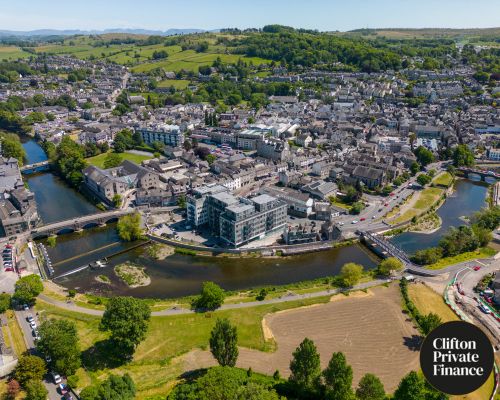Categories
How To Get Development Finance To Develop Property In London

London is still a city of cranes, scaffolding and builders' skips. The capital’s insatiable demand for housing and new forms of commercial property is fuelling a wide variety of ground-up building projects, and entrepreneurial redevelopment of everything from office blocks and churches to garages and large suburban homes.
The demand for office space in London is strong.
Reporting on the market in autumn 2019, US real estate services and investment giant CBRE found that take-up in central London was 3.4M square feet: above the quarterly average for the past 10 years. Availability had fallen by 3% compared with the previous quarter.
And the demand for residential units is urgent.
The need for specialist funding
Getting funding has been a major challenge, particularly for SME developers: 57% of those surveyed have said access to finance is their biggest obstacle.
This is when having a development finance team working on your behalf proves absolutely essential.

Our experienced development brokers at Clifton Private Finance will get you sitting at the table with the specialist lenders who will look at your project on its own merits and apply their lending criteria flexibly.
So, what kind of finance do you need?
Need funding for your development project? Learn about our property development finance service in the video below:
The development finance issues we can solve for you
1 You need substantial finance
Most developers have their money hard at work, not stashed away waiting for the next project that comes along. So you're likely to need access to a substantial amount of funding from specialist development finance lenders.
You will have taken into account your land or property purchase price, and build costs. Less experienced developers sometimes fail to make adequate provision for:
- Legal and administrative charges
- Planning application costs – and the time-cost of any possible planning delays
- Project management costs
- Marketing and selling transaction costs
- Potential unforeseen events (serious illness of key team members, bad weather delays, non-delivery of key materials etc)
Planning contingency finance for these additional costs is what marks out the experienced developer and makes lenders feel confident.
There are fewer lenders available for ground-up projects, which affects the cost of borrowing. For refurbs and conversions with a low LTV we can find you a lender offering 6% on top of base rate, ie from 0.55% per month. For LTVs up to 60% there are plenty of willing lenders around 0.58%.
2 You need fast finance
You may be looking to buy at auction, or you’ve identified land available for development, or a property suitable for refurbishment or subdivision. These opportunities don’t sit around waiting to be picked up, so you need to be able to move quickly.
Traditional institutional lenders may take weeks, or even months, to process an application. You need to be able to access specialist lenders and private investors who are able to assess applications more flexibly and make decisions quickly.
3 You’re looking for 100% finance
It’s not unknown for developers to be looking for 100% finance for a property development. And you may not have another asset available to offer as a security.
Depending on your track record as a developer, the purchase price of the property or land, and its Gross Development Value (GDV), it may be possible to find an entrepreneurial lender who will lend 100% of the project cost, secured against the value of the property.
4 Your property isn't currently mortgageable
Entrepreneurial developers are always looking for opportunities to buy properties in need of substantial refurbishment or redevelopment, in order to make improvements and / or subdivide and sell on. You'll be aware that traditional lenders will not lend on residential properties that are:
- derelict
- have structural issues
- without a functioning bathroom or kitchen
For all of these situations you'll need finance from a specialist lender.

5 You need a lender who will be flexible on experience
Traditional high-street lenders tend to take a fairly rigid view of eligibility: they have set criteria for the level of development experience or portfolio profitability that they will consider.
It’s difficult but not impossible to get finance if you are a novice.
Specialist lenders have been willing to lend to first-time developers who are particularly wedded to a project or who have sufficient equity to support the risk.
It will be in your favour if you can demonstrate that you're across all the planning issues and have an experienced architect and builder on board. For example, you may be converting an inherited property into flats, one of which will be your own residence.
6 You need to keep control of the project
Developers who have experience of working with high-street lenders will know that they like to manage the finance of a project in their own way – which can have significant knock-on effects on its progress.
Conventional lenders will only release funds in stages and after periodic site inspections. Sometimes they may require that a particular piece of work has been completed before they will release funds – but you need the funding in order to complete that stage of the project.
We can look at pairing you with a lender who works more flexibly. Or we can set up short-term finance from another lender in order to pass their primary lender’s inspection and receive the staged-release funds.
Your refurbishment and development finance options
1 A bridging loan
Bridge finance is a type of short-term lending that can access a large amount of money for you quickly. We regularly work with lenders who can provide finance within seven working days.
Bridging loans are frequently used by builder/developers for:
- Auction property purchase
- Commercial property development
- Residential property refurbishment and conversions
- Self-build development
- Land purchase
Bridge finance is a short-term solution to "bridge" the gap whenever there is a shortfall in funding. And it can be tailored to your specific finance needs.

Our bridging loan service
As a specialist property finance broker, we work with a network of lenders who are prepared to lend on land or property developments needing:
- finance from £50,000 to £25M
- loan terms from 3 months to 3 years
- LTVs up to 80% (can be more if other assets are included)
- low rates (we can access from 0.44% a month)
- lower rates for loans over £1M
- low valuation fees (we work with lenders who offer a £99 valuation option for properties up to £1M)
Key features of bridging loans
- You need an exit plan...
Every bridging loan lender will require that you have a clearly identified means of repaying the loan at the end of the term of finance, such as raising a standard mortgage, or selling the property.
Although short-term finance is not as cheap as standard mortgage finance, it gives developers access to quickly-available development finance.
- Rolled-up interest...
You have the option of making monthly interest payments or rolling-up the interest to pay at the end of the term of finance.
The option to pay the interest at the end of the term enables you to use the entirety of the loan on your development and repay the total loan when you carry out your exit plan.

Bespoke bridging loans
No two development projects are the same, and the structure of your bridging loan can be adapted to your particular needs. Most bridging loan lenders have a variety of products we can investigate to find the most suitable funding for your project.
Light-refurbishment bridging loans are specifically designed for smaller development projects and often have slightly lower interest rates. Different lenders have different criteria, but they may include:
- Planning permission is not required
- Building regulations do not apply
- There is no change to the nature of the property
Heavy refurbishment bridging loans are tailored to larger development projects and usually carry higher interest rates. Typically, a heavy refurbishment bridging loan will be appropriate for projects where:
- The development costs over 15% of the value of the property or land
- Light refurbishment criteria do not apply
- Structural work is required
See similar: Airspace Development Loans
How much could you access on a bridging loan?
Get a quick idea of the finance that could be available to you by using our online calculator:
2 Mezzanine development finance
This form of financing could give you the more generous LTV you're looking for, and also has tax-deductible interest.
It's more expensive, and your lender may require equity in the development, or a warrant to acquire equity at a later date. So you may need to be prepared to sacrifice some control and profit-share.
3 Development finance
This form of finance, with staged funding which you pay for as you access it, is generally reserved for experienced developers.
Lenders usually want to see evidence of a proven track record of successful projects, though it may be possible to get development finance if we can persuade them of your other relevant experience or commitment to the project.
If they like the look of a project and the numbers stack up, most development finance lenders will be comfortable with granting development loans up to 65% of the GDV.

4 A joint venture partner
Matching with a joint venture partner, or partners, where two or more developers pool their resources to fund a development, can be a particularly useful option for less-experienced developers.
You will need to make a significant contribution to the joint venture, such as a deposit, or the land for development. It's not sufficient just to have identified the development opportunity and have done the pre-planning work.
Different joint venture partners have various lending limits: most will lend up to 50% of the GDV, and sometimes up to 100% of the building costs.
To reflect the risk joint venture partners take on, most will insist on sharing the profits of the development. The percentage of profit share will depend on our negotiations with the JV lender.
Clifton Private Finance will source the finance you need
Nearly all of these finance options are available only from lenders who work through intermediaries: a specialist property finance brokers such as Clifton Private Finance.
We see many developers who have taken their plans for development in Zones 1-3 of central London round a series of funding advisers, who've assured them of success but have subsequently been unable to deliver.
Our close relationships with private banks, specialist lenders, family offices and wealth managers give us access to the funding sources you need for a development project in London. Contact us on:
0203 900 3040
Our property development finance service
READ ALSO our blogs about:
How to get development exit finance as your building project nears completion
How to get a property development loan for a house in London
And if you've found this blog useful do pass it on:












